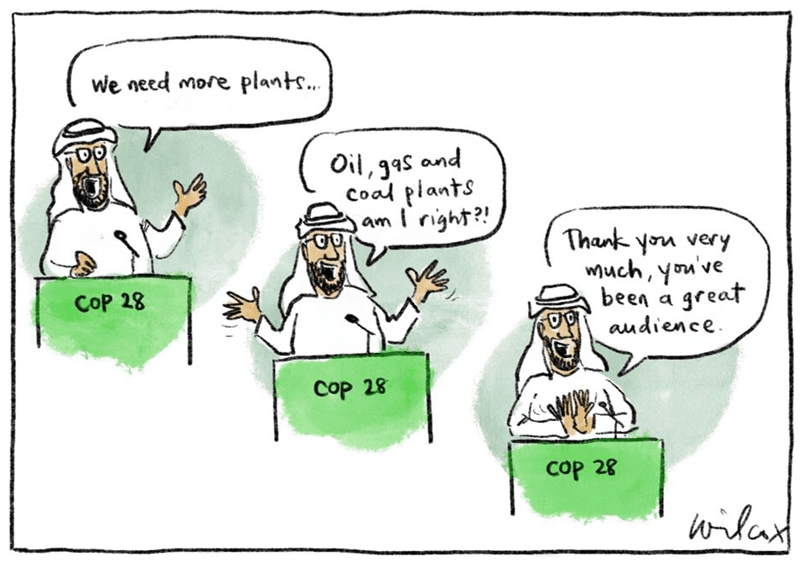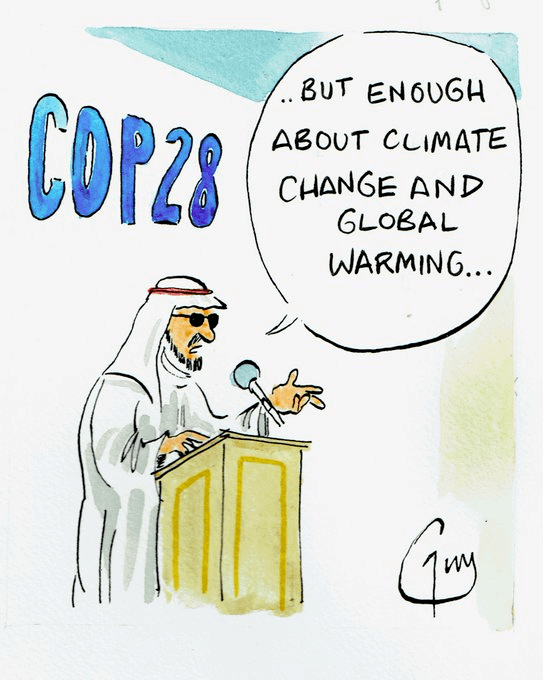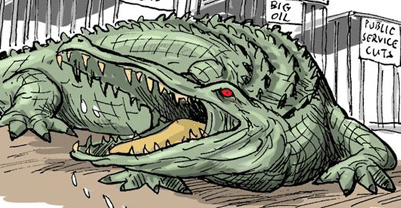
The resumption of war in Gaza is no rumor, though Glen LeLievre manages at least to inject a note of dark comedy, noting the futility of the recent ceasefire. There are all sorts of ways this could have been a maudlin reflection, but the Warner Brothers cartoon mood, IMHO, is more eye-catching and effective.

By contrast, Patrick Chappatte makes his point through comparison rather than gallows humor, with a large body of tanks headed in while a lone Red Cross ambulance bucks the traffic, and the effort.
Netanyahu’s government explains that they’ve warned civilians to evacuate, but they haven’t explained how or to where this should happen, and, having pounded the north while civilians fled south, they are now pounding the south.

Jeff Danziger is perfectly willing to be grim under the circumstances. The Israeli government has declined to renew the visa of the top United Nations humanitarian aide for Palestine, saying that the UN, which has accepted Palestinian estimates that 40% of the roughly 15,000 civilian dead in Gaza were children, is biased against Israel.
It’s true that Hamas is using civilians as shields, purposefully centering near hospitals and similar areas seen as unlawful targets under international law. The question, however, is whether that means their enemies are freed from normal restraints, or that they must find ways to proceed without targeting those civilians.
American officials, including VP Harris, have begun speaking out publicly to urge an end to the attacks on civilians, and Defense Secretary Lloyd Austin warns that “In this kind of a fight, the center of gravity is the civilian population. And if you drive them into the arms of the enemy, you replace a tactical victory with a strategic defeat.”
His point is a universal truth of asymmetric warfare. The support of Gazans for Hamas may not be overwhelming, just as the support of Iraqis for their guerrilla forces, the support of Afghans for the Taliban or the support of Irish Catholics for the IRA have all been dubious.
But their support for “our boys” is steadfast, and, in this case, seeing entire families killed is not going to make it easy, or perhaps even possible, to make peace in the region.
Ever.
War on the Environment

COP28, the international conference on climate change, drew a great deal of skepticism for being hosted in Dubai, whose economy is largely based on fossil fuels. It may have been premature to assume the worst of the host company, and it was quibbling to grouse over the obvious fact that participants would be arriving by airplanes rather than on bicycles or in ox carts.
But once things got under way, it seemed the doubts were not unfounded, and First Dog on the Moon does a takedown not so much on the mixed messages as on the unmixed messages that have emerged.

Cathy Wilcox cut to the chase, mocking Sultan Al-Jaber, who presided over the conference, for claiming in an interview ““There is no science out there, or no scenario out there, that says that the phaseout of fossil fuel is what’s going to achieve 1.5.”
He is now attempting to walk back the remark, but his explanation that he actually feels fossil fuels must ultimately be abandoned is not making the splash he achieved the first time around.

Guy Venables, for instance, isn’t buying the new, improved, reformed sheik, while Dubai’s king’s speech, which was very supportive of COP28 goals, has gone virtually unreported.
The conference did, however, issue a statement about climate change.
They’re ag’in it.
War on Health


New Zealand drew praise under former Prime Minister Jacinda Ardern for its fast and effective moves to make the Covid pandemic a lesser threat to the nation than it was elsewhere, which overshadowed another health advancement: They also passed a law, effective next year, banning sales of tobacco products to anyone born after 2008.
This would have eventually wiped out smoking there, as younger people would not be able to take up the habit, but New Zealand’s new government has announced its intention to scrap the law because, in addition to the impact on sales for shops selling tobacco products, it would also cost the government a great deal of tax moneys.

As Guy Body’s cartoon explains, the new government feels it’s up to individuals to make their own decisions about personal health and addictive products.
Juxtaposition of the Day


I so often disagree strongly with both Bok and Gorrell that it comes as a shock when they each come up with opinions I endorse, and, as it happens, both cartoons have to do with today’s topic of war.
Bok is right: We’re about to run out of funding for Ukraine and the Republican hardliners seem content to play the Neville Chamberlain role in appeasing an ambitious dictator so that, instead of squelching him at the start, we can wait until we have to send our own young people to die in a war that could have been contained.
Gorrell offers a less practical and a completely unlikely solution to our burgeoning civil war, and it’s funny that more comments at GoComics quibble over how the map is divided, rather then how impossible it is to believe in the solution.
I’ve remarked in the past that, in our first civil war, we had the advantage that most of the combatants were from specific regions separate from each other. It didn’t keep brothers from killing brothers on the battlefield, and it’s bad history to assume that everyone in each of those regions agreed on the war.
But at least you could walk down a street in Burlington or visit a synagogue in Austin and feel safe, and you didn’t see stickers praising Jeff Davis on the backs of buggies in Chicago.
War without Guilt

Can’t conclude today’s topic without allowing Existential Comics to point out its pointlessness.
It’s particularly relevant at the moment in regard to the Middle East, where, however you feel about it, you’re more likely to be accused of being bigoted rather than attacked for your analysis.
Taking neither side is even worse.
The popular question is “War! What is it good for?” but that assumes someone feels it is good.
Something else to disagree over.

‘First Dog’ mentions the most dangerous aspect of our climate: ‘toxic emissions’. And, the most deadly of those emissions are those of the corporate climate denying greedsters aided and abetted by the congress critters they own and broadcast by MainSlimeMedia.
And, that’s a bad pun: ‘Existential Comics to point out its pointlessness’ when they are going to use swords to ‘kill all the philosophers’ REF. https://www.existentialcomics.com/comic/520 .
I always hear Edwin Starr’s angry singing whenever anyone says ‘War, what is it good for?’
“It’s true that Hamas is using civilians as shields, purposefully centering near hospitals and similar areas seen as unlawful targets under international law. The question, however, is whether that means their enemies are freed from normal restraints, or that they must find ways to proceed without targeting those civilians.”
This is what I’ve been saying since Day 1 of the Israel-Hamas War: if terrorist are using innocent hostages as human shields, and your response is “oh well, guess I’ll just have to kill the hostages to get at the terrorists” then congratulations! You are officially no better than the terrorists.
And don’t give me that “Israel has told the civilians to flee” garbage. What good is fleeing when they have nowhere to flee to and it’s 9/10 chance they are going to get bombed anyway?